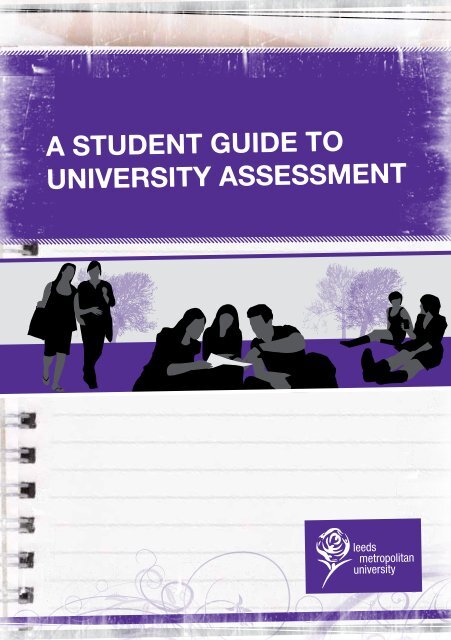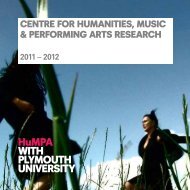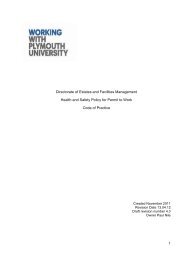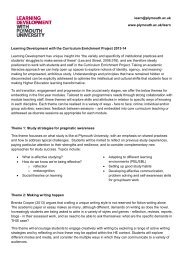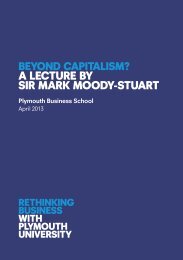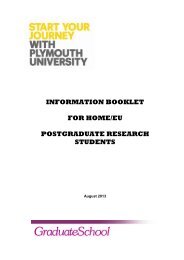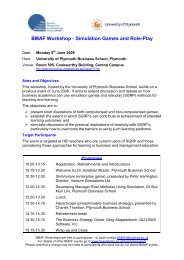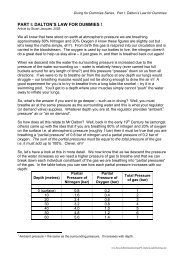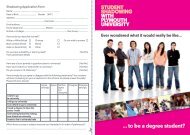Students Guide to Assessment - Plymouth University
Students Guide to Assessment - Plymouth University
Students Guide to Assessment - Plymouth University
- No tags were found...
You also want an ePaper? Increase the reach of your titles
YUMPU automatically turns print PDFs into web optimized ePapers that Google loves.
OTHER TYPES OF ASSESSMENTBY FACULTY/SUBJECTGetting full marksIn some assessments the pass mark has <strong>to</strong> be 100% owing <strong>to</strong> thenature of the subject area being tested. For example, ‘AuthenticWorld’ is an innovative computer-based learning package whichhelps students <strong>to</strong> understand medication dosage calculations.Throughout their learning, students will work with the package<strong>to</strong> develop skills and can make mistakes in an safe environment.Later in their course the students will use the the same software<strong>to</strong> undertake an assessment <strong>to</strong> test their knowledge in this area.As giving an incorrect dosage <strong>to</strong> a patient can be life-threatening,this is the sort of area where students are expected <strong>to</strong> achieve a100% pass mark. If you think this is high, would you want <strong>to</strong> begiven medication by a student who got 99%?Group work and collaborative assessmentsThe nature of some professions is that it is an essential skill<strong>to</strong> be able <strong>to</strong> work within an intra-professional team. Someof the assessments will therefore test the ability of students<strong>to</strong> work <strong>to</strong>gether and share information. <strong>Assessment</strong>s mayinvolve working <strong>to</strong>gether <strong>to</strong> produce an information booklet orundertaking case study work.Computer-based testsThese may be new <strong>to</strong> you, but you’re very unlikely <strong>to</strong> be givensuch a test ‘cold’. Normally, there will be computer-basedlearning materials <strong>to</strong> practise on, and it’s a really good idea <strong>to</strong> getup <strong>to</strong> speed with working at a computer using such materials, sothat when you get a computer-based test, you know the ropes,and don’t waste time trying <strong>to</strong> work out what <strong>to</strong> do.Multiple choice questionsMultiple-choice questions are used in computer-based tests,where your job is <strong>to</strong> pick the right (or best) option from severalin front of you. Don’t just look for what is ‘right’. Look at all theother options quite carefully, and work out what’s wrong withthem, until you’re left only with the best one <strong>to</strong> select.Objective Structured Clinical ExamsThis type of assessment is often used in medical and otherhealth-related university education. You may come across aversion of it in other courses, particularly where there arepractical components <strong>to</strong> the skills that you are taught.1415
FAQs1. How will I know how good my work is?2. Will my lecturer give me feedback onmy work before I hand it in?3. What can I do if I can’t finish anassignment in time?4. What can I do if I think I’m on a course wherethe assessment is just <strong>to</strong>o hard for me?5. What can I do if I fail?6. How long will I get <strong>to</strong> complete myassignments?7. Will I get the assignments, for all the modulesthat I am studying, all at the same time?8. Will I know when <strong>to</strong> expect assessments?How will I know how good my work is?<strong>University</strong> staff are here up <strong>to</strong> help students understand howthey are doing by giving them feedback on assignments.Don’t confuse this with some of the negative experiences youmight have had at school where markers have concentratedon telling you everything you have done wrong. Feedback atuniversity is specifically designed <strong>to</strong> tell you how <strong>to</strong> improve,and <strong>to</strong> let you know what you’re already doing well. When youknow what you have done well you can do more of it, so getfeedback from your tu<strong>to</strong>rs even when you have done well andare happy with your mark.Will my lecturer give me feedback on my work before Ihand it in?One of the big differences you may notice betweenassessment at school and university is that, at university, youwon’t usually receive feedback on a piece of assessed workbefore you hand it in. You really need <strong>to</strong> ensure that the workyou submit is the very best you can do in the time available.Take notice of any feedback so that you can use this <strong>to</strong>improve future assignments. You may find that work in eachof the tu<strong>to</strong>rials leads <strong>to</strong> the final piece of assessed work. Soyou can continue <strong>to</strong> receive feedback during the semester.What can I do if I can’t finish an assignment in time <strong>to</strong>hand it in for the deadline or if I have problems getting infor an exam?Unlike some schools and colleges, at university, a deadlineis just that, and you will be penalised if you hand work in lateor fail <strong>to</strong> turn up for an assessed event. There are things thatyou can do if you have a problem, for example:- if you can tell the person who set the assignment as soonas you know you are going <strong>to</strong> have a problem.1819
FAQWill I get the assignments for all the modules that I amstudying all at the same time?You may receive all of the details about all of theassignments at the beginning of each semester, and youshould look carefully at the hand-in dates for each pieceof work. As has been said earlier it is useful <strong>to</strong> break downeach piece of work in<strong>to</strong> smaller component and enter each ofthese in<strong>to</strong> your diary.Not all university assessments require submitting at thesame time, but there are key times, e.g. <strong>to</strong>wards the end ofthe semester, when you have a number of assignments. Youwill need <strong>to</strong> plan your time carefully if you have more thanone. Look at the hand-in dates of them all and plan yourdiary. All things being equal start with the assignment youlike most and finish it early – this will build your confidenceand motivate you <strong>to</strong> tackle the others.Will I know when <strong>to</strong> expect assessments?All assessments are planned in advance and your lecturerswill be able <strong>to</strong> tell you when they expect <strong>to</strong> hand them outand want them in. Consider assessment times when you areplanning your work, holidays etc. Holidays should not be takenduring the academic year. Look at the calendar of semesterdates on the student portal. <strong>Assessment</strong>s are an importantpart of your time at university so plan <strong>to</strong> give them your bestshot. If you have any other questions about assessments in thefirst year at university please don’t hesitate <strong>to</strong> contact us atstudentguide@leedsmet.ac.uk.2223
Leeds Met First Level <strong>Assessment</strong>& Feedback ProjectThis student guide <strong>to</strong> university assessment has been producedas part of the First Level <strong>Assessment</strong> and Feedback Projectat Leeds Metropolitan <strong>University</strong>. This is a National TeachingFellowship Scheme project jointly funded by the HigherEducation Academy and Leeds Metropolitan <strong>University</strong>.This version of the guide is a revised edition of the previousprinted version, which was published in September 2009.We would like <strong>to</strong> acknowledge the contribution of LeedsMetropolitan <strong>University</strong> students Karly Procter and DarcyAmamou, who provided the student voice <strong>to</strong> this guide.To enquire about purchasing a site licence, enabling you<strong>to</strong> cus<strong>to</strong>mise this guide for your own institution (withacknowledgement of the original author and publisher), pleaseemail publications@leedsmet.ac.uk or telephone 0113 812 9257.For more information about the First Level <strong>Assessment</strong> andFeedback Project contact the project manager:Janice Priestley<strong>Assessment</strong>, Learning and TeachingLeeds Metropolitan <strong>University</strong>Email: flap@leedsmet.ac.ukISBN 978-1-907240-17-1© Leeds Metropolitan <strong>University</strong> 2010


